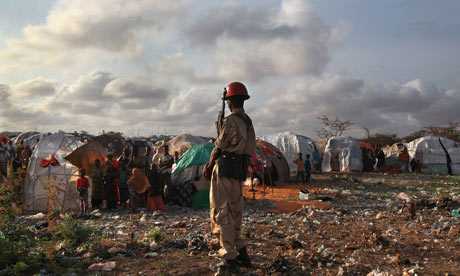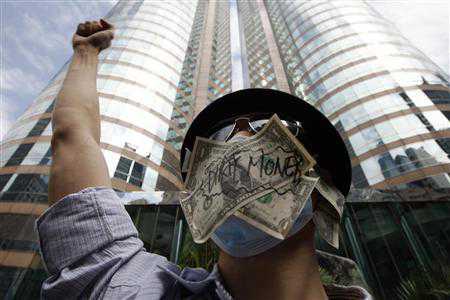EU and American delegates to a conference on Somalia’s future could learn from Turkey’s direct assistance to those in need
guardian.co.uk

Thousands of Somalis have ended up in camps because of famine, piracy and the influence of insurgents like al-Shabab. Photograph: John Moore/Getty Images
The British government is holding a conference on the future of Somalia next month. In the last 20 years the east African country has suffered enormously – in the collapse of law and order, natural and human-made calamities, the displacements of its citizens, the rise of piracy and the spread of insurgent movements and seditious militias. These have not only threatened the survival of the nation but also dampened the morale of the people and their sense of national pride.
Today, Somalia is enduring the region’s worst famine and drought for 60 years, threatening 750,000 lives. This human tragedy has spurred the conscience of the world and there has been an influx of international aid agencies, especially those of the United Nations, despite huge obstacles including harassment by the al-Shabab insurgent movement.
This intervention has saved many lives. But long-term, foreign-sponsored formulas for solving crises have ended in failure, largely because they deliberately ignore the main aspirations of the Somali people, for national sovereignty, territorial integrity and their right to self-determination.
Alongside this, one country, Turkey, has responded in a unique manner, demonstrating solidarity with the people of Somalia in their hour of distress. Last August, amid a tense security situation, prime minister Recep Tayyip Erdogan, accompanied by his wife and children and a large delegation of ministers and civil servants, landed in the capital Mogadishu. He was the first foreign head of government to have visited the city in 20 years.
The Somali people wholeheartedly appreciate this act of bravery and nobility. This can be gauged from the hundreds of boys born after the visit who have been named “Erdogan”, and girls who have been named “Istanbul”. His example inspired so many across the region, and high-level delegations followed, such as the visit of Prince Alwaleed Bin Talal of Saudi Arabia and the foreign minister of Iran, Ali Akbar Salehi.
Two days before his visit, the Turkish prime minister had called a meeting of the Organisation of Islamic Co-operation (representing 40 countries), in Istanbul. He persuaded them to allocate $500m to famine relief in Somalia. This was in addition to approximately $280m donated by the Turkish people. Subsequently he used his speech to the UN general assembly last September to draw attention to the trauma that has been suffered by the Somalis, and appealed to their sense of humanity and responsibility.
In the Turkish magazine Foreign Policy, Erdogan commented that Somalia had been abandoned by the international community, and that this did not serve the cause of peace and stability. He outlined how Turkey would contribute towards the rehabilitation of Somalia and appealed for UN agencies serving our country, currently located in Nairobi, to be transferred to Mogadishu.
It was the right call at the right time, because there is now no security problem in Mogadishu, since the insurgents have been expelled from the capital by the Africa Union troops with the support of the Somali people. To prove the point, the Turkish embassy has been opened and a large community of Turkish experts and technicians are living in Mogadishu.
In the capital, they are constructing government and parliament buildings and a new 400-bed hospital, asphalting the road between Mogadishu airport and the city centre and providing garbage trucks and a waste-disposal facility. They are also contributing to agricultural and livestock development, and constructing wells, vital to the eradication of drought and famine. Turkey’s deputy prime minister, Beşir Atalay, flew in recently to inaugurate the expansion of Mogadishu airport.
American and EU aid to Somalia is primarily focused on financing the African Union forces, as well as covering the essential running costs of the government and transitional institutions. So far, nothing has been provided for initiatives to satisfy the basic needs of the people and bolster its governance. Their current strategy, which mainly concentrates on the war against terrorism and piracy – such as this week’s US raid to free western hostages – does not enable the population to reap the dividends of peace.
What can be learned from the Turkish initiative is that when you provide sincere assistance directly and immediately to those who are most in need, you gain the hearts and minds of the people. Next month’s London conference on Somalia should strongly support both the efforts to deal with terrorism and piracy and the urgent humanitarian and development programmes needed to restore peace and stability in Somalia and the Horn of Africa.
via Only Turkey is showing solidarity with Somalia’s people | Osman Jama Ali and Mohamed Sharif Mohamud | Comment is free | guardian.co.uk.

